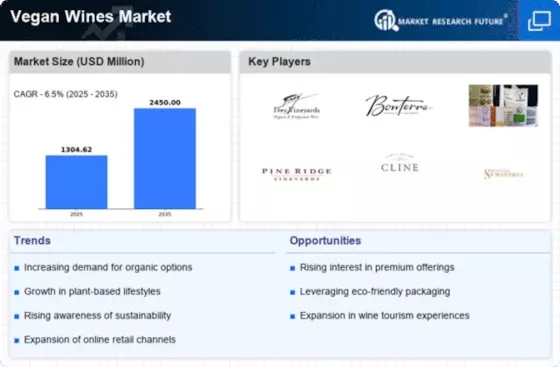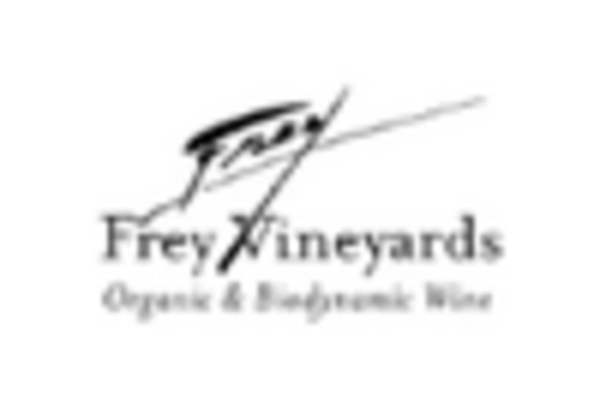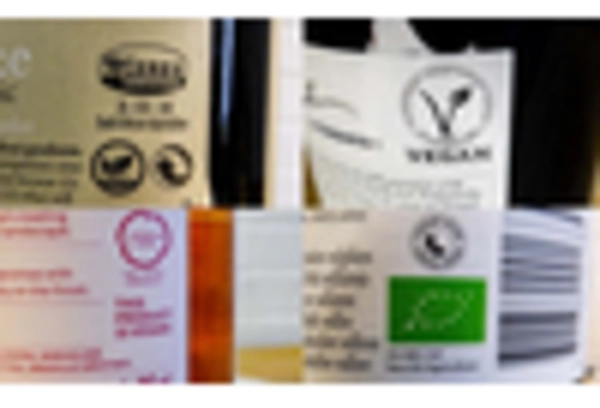Cultural Shift Towards Veganism
A significant cultural shift towards veganism is influencing the Europe Vegan Wines Market. As more individuals adopt vegan lifestyles, the demand for vegan wines is expected to rise correspondingly. This cultural transformation is not merely a trend but appears to be a long-term change in consumer behavior. Market data suggests that the number of vegans in Europe has increased by over 30% in recent years, indicating a substantial shift in dietary preferences. This growing demographic is likely to seek out vegan wines, further driving market growth. The Europe Vegan Wines Market stands to benefit from this cultural evolution, as it aligns with the values and preferences of an increasingly health-conscious and ethically-minded consumer base.
Increasing Health Consciousness
The Europe Vegan Wines Market is experiencing a notable surge in demand driven by a growing awareness of health and wellness among consumers. As individuals increasingly seek healthier lifestyle choices, the appeal of vegan wines, which are perceived as free from animal-derived fining agents, becomes more pronounced. This trend is reflected in market data indicating that the sales of vegan wines in Europe have risen by approximately 20% over the past year. Consumers are gravitating towards products that align with their health goals, and vegan wines are often viewed as a cleaner, more natural option. This shift in consumer behavior is likely to continue, suggesting a robust future for the Europe Vegan Wines Market.
Innovative Marketing Strategies
Innovative marketing strategies are playing a crucial role in the expansion of the Europe Vegan Wines Market. Producers are increasingly leveraging social media, influencer partnerships, and targeted advertising to reach a broader audience. By highlighting the unique attributes of vegan wines, such as their ethical production methods and health benefits, marketers are effectively engaging consumers. Recent data indicates that brands employing these strategies have seen a 25% increase in consumer engagement. This proactive approach not only raises awareness about vegan wines but also cultivates a loyal customer base. As marketing techniques continue to evolve, the Europe Vegan Wines Market is likely to experience sustained growth, driven by effective communication of the benefits of vegan wines.
Regulatory Support for Vegan Products
The Europe Vegan Wines Market benefits from a favorable regulatory environment that supports the growth of vegan products. Various European countries have implemented policies aimed at promoting plant-based diets and reducing the consumption of animal products. For instance, the European Union has introduced initiatives to encourage sustainable agriculture and reduce carbon footprints, which indirectly supports the vegan wine sector. This regulatory backing not only enhances the visibility of vegan wines but also fosters consumer trust in these products. As regulations continue to evolve, the Europe Vegan Wines Market is likely to see increased growth opportunities, as consumers become more aware of the benefits associated with vegan wines.
Sustainability and Environmental Concerns
Sustainability is a pivotal driver in the Europe Vegan Wines Market, as consumers become increasingly concerned about the environmental impact of their choices. The wine industry, traditionally associated with various environmental challenges, is witnessing a shift towards more sustainable practices. Vegan wines, which avoid animal products in their production, are often perceived as a more eco-friendly option. Data indicates that a significant portion of European consumers, approximately 60%, prioritize sustainability when selecting wines. This growing emphasis on environmental responsibility is likely to propel the demand for vegan wines, as consumers seek products that align with their values and contribute to a more sustainable future.
















